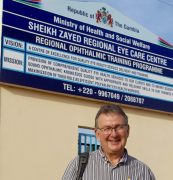I thought I had some idea about the problems facing people with eye conditions in less developed countries. I couldn’t have been more wrong. The feeling of dejection at the end of the first morning clinic is something I will never forget.
The clinical conditions by and large were the same as we encounter in the UK. The advanced stage of glaucoma, diabetes and cataract in the relentless wave of humanity that I had seen that morning came as a surprise. Patients do not present with visual problems until they begin to lose sight in their second eye – by which time they have advanced glaucoma or diabetic retinopathy or are led in by the hand because of their bilateral mature cataracts. There are a large number of patients who are already blind in one eye due to trauma.

Treatment of any kind is limited. Diabetic control is poor, there was a newly arrived laser but (almost) no-one had been trained to use it. There is effectively one topical treatment for glaucoma, many patients cannot get a regular supply.
Nurses performed the role of junior doctors, seeing clinic patients, operating on cataracts. The enthusiasm of some to learn was remarkable, soaking up information, applying their newly acquired knowledge with confidence and enthusiasm. That aspect of the visit was very rewarding, as was the obvious gratitude of patients in general. The irrepressible cheerfulness of the Singleton team was wonderful. The aim became to assess the level of knowledge, then incrementally improve on that in a way that was sustainable and transferrable to others.
The visit has left an indelible memory, a fairy tale ending it was not.

